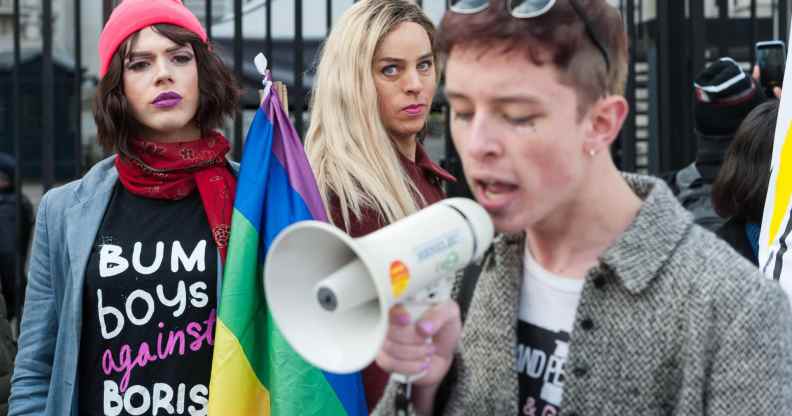Labour is still miles ahead with LGB voters, study finds – and Boris Johnson isn’t helping matters

Members of LGBTQ community protest outside Downing Street on 07 December, 2019 (WIktor Szymanowicz/NurPhoto via Getty)
Landmark research by the London School of Economics (LSE) showed that LGB voters are 14 per cent more likely to vote for a socially liberal party than their straight peers.
The case study analysis, led by Dr. Stuart Turnbull-Dugarte of the University of Southampton, focused on how the Conservative Party’s gradually improving LGBT+ policies may have closed the sexuality gap in voters’ choices.
In the report, Turnbull said: “When it comes to understanding the motivations behind voters’ electoral choices in Britain, sexuality should not be ignored.
“Nevertheless, the Conservative Party’s current leader and prime minister, who in 1999 described gay men as ‘tank-topped bumboys’, in 2000 called Labour’s desire to repeal Section 28 ‘appalling’, and in 2001 compared same-sex marriage to bestiality, may do little to remedy the party’s anti-LGBT+ image and attract those citizens to cast a vote for his party at the ballot box.”
Despite Boris Johnson repeatedly refusing to apologise for his ‘tank-topped bum boys’ jibe and describing efforts to appeal Section 28 as appalling, the prime minister did eventually U-turn, voting for the repeal of Thatcher’s homophobic law and backing same-sex marriage.
LGB people more likely to vote Labour, Lib Dem or Green than straight people
The analysis asked participants to self-report their vote choice for the 2017 general election. The results showed that more than half (52 per cent) of LGB voters reported to have voted for the Labour Party. This result was 15 points higher than the “heterosexual bloc”.
Suport for the Tories on the other hand was 13 points lower among queer voters than their straight counterparts at 18 per cent.
The findings also showed that LGB people were more likely to vote for other left-leaning parties such as the Liberal Democrats and the Green Party, and that queer voters are less likely to abstain on polling day.
It also showed significantly less support for UKIP among LGB voters. This is in line with prior research that those from sexual minorities are more likely to support the EU.
Previous studies showed that Labour had a surge of support from LGBT+ voters in the 2017 general election. Similar analysis in the United States also showed that LGBT+ people were more likely to vote left-wing, with 73 per cent of queer Americans voting for Biden in the 2020 election.
Building on previous research, the report also showed that LGB voters are far less likely to abstain from voting.
Unfortunately, the study was not able to include the voting preferences of trans people, because the UK Household Panel Study used for this analysis doesn’t ask about gender identity outside of the male/female binary.

